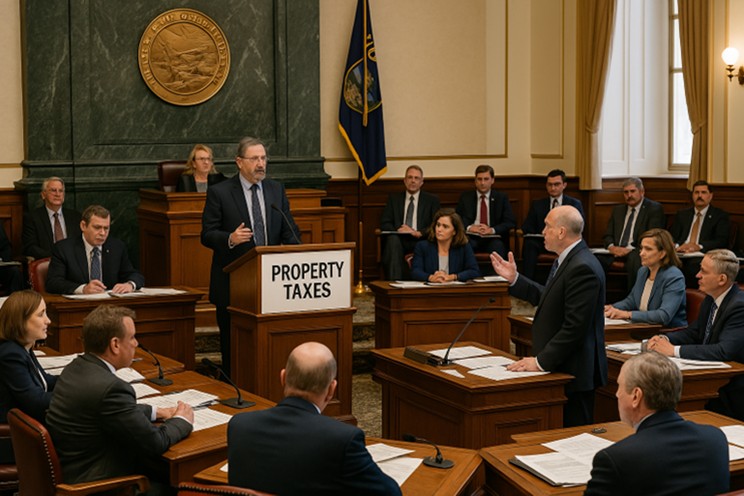Montana's 69th legislative session has been characterized by significant efforts to tackle the state's rising property taxes. As property values soar, lawmakers have introduced several proposals aimed at offering relief to homeowners and ensuring a fair tax system.
House Bill 231: Governor's Signature Proposal Tax Proposal
One of the central pieces of legislation is House Bill 231, developed by Governor Greg Gianforte's Property Tax Task Force and championed by
Llew Jones from Conrad. This bill seeks to modify Class 4 residential and commercial
taxable rates, reducing property taxes for some homeowners and long-term landlords,
while increasing taxes on second homes and short-term rentals, such as those listed
on Airbnb. However, there is no change to agricultural property tax rates.
The bill aims to redistribute the tax burden from lower-valued residential and commercial
properties to higher-valued properties. It also prevents the tax burden from disproportionately
shifting onto centrally assessed properties. However, HB 231 has faced resistance
in the Senate, with some lawmakers expressing doubts about its approach and effectiveness.
Even in the House, each reading received few votes. Before sending it to the Senate,
the vote stood at 68-30, down from 75-25.
|
Property Type
|
Current Rates
|
Proposed Rates
|
Value-Neutral Rates
|
|---|---|---|---|
|
Residential (preferred)
|
1.35%
|
1.1%
|
0.94%
|
|
Residential (non-preferred)
|
1.35%
|
1.9%
|
0.94%
|
|
Commercial (preferred)
|
1.89%
|
1.5%
|
1.62%
|
|
Commercial (non-preferred)
|
1.89%
|
2.1%
|
2.15%
|
- Residential (preferred): Applies to primary residents and long-term rentals valued at less than two times the median residential market value.
- Residential (non-preferred): Applies to out-of-state residents, short-term rentals, and the portion of property value exceeding two times the median residential market value.
- Commercial (preferred): Applies to commercial properties valued at less than six times the median commercial market value.
- Commercial (non-preferred): Applies to the portion of commercial property value exceeding six times the median commercial market value.
Comments:
- Proposed taxable value rates exceed value-neutral rates based on the DOR estimates. The bill is viewed as a permanent property tax increase in comparison to the 2022 assessment cycle, even though it remains revenue-neutral for the 2023 assessment cycle.
- Bill will have fewer residential properties classified as ‘preferred’. The Property Tax Task Force established that non-preferred residential properties exceed four times the median value, while HB 231 set this threshold at twice the median value.
- Shifts the tax burden among counties and slightly among property classes. There is minimal tax burden shift to centrally assessed properties.
- Reduces the tax base by relying on a few higher-valued properties that pay more taxes.
House Bill 528: An Straightforward Tax Rate Reduction
House Bill 528, sponsored by Ed Byrne from Bigfork, proposes a reduction in tax rates for residential,
commercial, and agricultural properties. This rebalance aims to offset the rapid increase
in property values experienced during the pandemic. Residential properties values
below $1.5 million will be taxed at 0.76%, down from 1.35%, and values above $1.5
MM will be taxed at the current rate of 1.35%. All commercial and agricultural properties
will be taxed at 1.35% and 1.7%.
Supporters argue that it effectively rolls back property taxes to pre-pandemic levels,
while critics caution that it could lead to higher taxes for industrial properties
and create disparities in areas with varying property value growth. Prior to being
sent to the Senate, the vote was 90-9.
| Property Type | Current Rates | Proposed Rates | Value-Neutral Rates |
|---|---|---|---|
| Residential (value <$1.5MM) | 1.35% | 0.76% | 0.94% |
| Residential (value>$1.5MM) | 1.35% | 1.35% | 0.94% |
| Commercial | 1.89% | 1.35% | 1.62% |
| Agricultural | 2.16% | 1.7% | 2.15% |
Comments:
- At only six pages, this bill is an easy read and straightforward policy.
- The tax rate cuts surpass value-neutral tax rates, and signifies a permanent property tax cut compared to the 2022 assessment cycle for residential, commercial, and agricultural properties.
- The tiered residential tax rates aim to be progressive, requiring higher-value properties to pay a larger share.
- Agricultural properties receive a significant tax cut because their overall values have not increased substantially since the 2001–2004 valuation period.
- The bill reallocates part of the tax burden from residential, commercial, and agricultural properties to centrally assessed properties.
- An amended bill could guarantee the tax burden does not shift between classes by setting the commercial and agricultural taxable rates to 1.62% and 2.15%.
Senate Bill 434: Relief Through Property Tax Rebate
Amid ongoing debates, the Senate unanimously passed Senate Bill 434, introduced by Wylie Galt and dubbed "Plan C," which provides a one-time rebate of
$400 to primary property owners, similar to the rebates issued in 2023. Senator Galt
emphasized that this measure is a temporary solution while lawmakers continue to pursue
long-term property tax reforms. The second reading concluded with a unanimous 50-0
vote.
Senate Bill 322: Business Equipment Tax Exemption
The Senate approved Senate Bill 322, introduced by Josh Kassmier of Fort Benton, which raises the business equipment
tax exemption threshold from $1 million to $3 million. This measure aims to provide
tax relief for small businesses and is a priority for Governor Greg Gianforte. It
is estimated that 700 businesses will be removed from the tax rolls, resulting in a $1.3 million
decrease in revenue for schools and a 0.35% increase in taxes for other property classes.
Senate Bill 534: Telecommunications Industry Seeks Tax Exemptions
Senate Bill 534 aims to provide property tax exemptions for cell towers and other wireless infrastructure.
Supporters of the bill argue that these tax breaks would encourage the expansion of
services into rural areas, thereby enhancing connectivity throughout the state. The
proposal has progressed in the Senate and is now awaiting further debate.
Sales Tax to Offset Property Taxes
Several lawmakers are proposing a statewide sales tax to reduce reliance on property
taxes:
- Senate Bill 558, introduced by Shelley Vance of Belgrade, aims to implement a statewide sales tax to replace school property taxes.
- House Bill 841, sponsored by Brad Barker of Luther, proposes a constitutional amendment to ensure that any revenue from a sales tax is dedicated exclusively to reducing property taxes, unless a supermajority in the Legislature decides otherwise.
- House Bill 842, introduced by Brad Barker of Luther, seeks to place a referendum on the November 2026 ballot, asking voters if the Legislature should have the authority to enact a statewide sales tax of up to 4%, with the revenue used to reduce property tax funding for public education.
- House Bill 489, introduced by Greg Oblander of Billings, would allow Montana towns and cities to implement a local-option sales tax focused on tourism-related goods and services.
- House Bill 507 proposes a constitutional amendment to implement a sales and use tax in Montana, specifically aimed at reducing property taxes that fund K-12 education. This has already been withdrawn.
Comments:
- Supporters argue that a statewide sales tax would help diversify Montana’s revenue stream by capturing tourist spending and reducing the state’s heavy reliance on property taxes.
- Opponents contend that implementing a sales tax could undermine Montana’s competitive advantage as one of the few states without such a tax. They also point out that property taxes have been shown by Economists to be less detrimental to economic growth than sales taxes.
- Montana voters have previously rejected proposals for a statewide sales tax in 1973 and 1993.
- Governor Gianforte has consistently opposed a statewide sales tax and has pledged to veto any legislative attempts to introduce one. However, he does not have veto power over a sales tax enacted directly by voters through a citizen-initiated ballot measure.

Greg Gilpin
Professor

